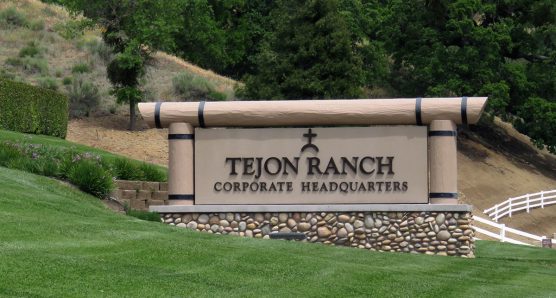By Nicholas Iovino
(CN) — Real estate developers who promised to fund a nonprofit dedicated to preserving 90% of a 270,000-acre property north of Los Angeles are violating a 12-year-old pact by cutting their quarterly conservation payments, environmental groups claim in a new lawsuit.
Tejon Ranch Company and Tejon Ranchcorp own the largest contiguous plot of private land in California. The massive property on the border of Los Angeles and Kern Counties sits at the intersection of four major ecosystems: the San Joaquin Valley, southern Sierra Nevada, Mojave Desert and California Coastal Range.
To appease environmentalists opposed to their large-scale development plans, the companies struck a deal in June 2008 requiring that 240,000 acres be set aside for conservation. Environmental groups agreed not to oppose development plans in exchange for the creation of the Tejon Ranch Conservancy.
In the coming years, Tejon Ranch moved forward with plans for new communities and mixed-use developments, including proposals for tens of thousands of new homes, shopping centers, golf courses and business parks. Some of the proposed developments, including a 12,000-unit development near California’s Grapevine community in Kern County, have been challenged in court by other groups.
As part of the 2008 deal, the conservancy was to be funded by a 0.25% transfer fee on home sales. Because sales were not expected to start until years later, the companies agreed to advance quarterly payments amounting to $800,000 per year to the conservancy through 2021.
But in April, Tejon Ranch announced it would reduce those payments by half, citing business disruptions related to the COVID-19 pandemic.
After environmentalists accused them of breaching the contract, the developers made full $200,000 quarterly payments as required under the terms of the deal for April and July of 2020.
Then came October, when the developers told the environmentalists they would place that quarter’s $200,000 payment and all future payments in an escrow account. The developers said they were entitled to keep those payments because the conservancy violated their deal by taking part in a regional planning study in 2017 that affected one of Tejon Ranch’s developments.
In a lawsuit filed in Kern County Superior Court on Wednesday, the Natural Resources Defense Council and four other groups say the developers cannot “unilaterally revise their payment obligations” under the terms of the agreement signed in 2008.
They also argue the agreement expressly permits them to support or oppose any regional plan, except where the effect of the plan is substantially limited to Tejon Ranch or would directly affect a Tejon Ranch project or project approval.
The regional plan draft, known as the Antelope Valley Regional Conservation Investment Strategy, covers more than 700,000 acres and overlaps with “a very small subpart” of Tejon Ranch’s proposed 12,300-acre Centennial project, the environmental groups say in their lawsuit.
“Defendants’ years-late contention that plaintiffs breached the [agreement] by participating in the [Antelope Valley Regional Conservation Investment Strategy] in 2017 is meritless,” the complaint states. “It is a pretext to justify avoiding the required payments to plaintiffs under the [agreement].”
The conservation groups seek a court order requiring Tejon Ranch Co. and Tejon Ranchcorp to release the $200,000 payment for October 2020 and continue making the quarterly payments through Oct. 1, 2021.
The National Audubon Society, Endangered Habitats League, Planning and Conservation League and Sierra Club are also plaintiffs in the lawsuit. They are represented by David Berger of Wilson Sonsini Goodrich & Rosati in Palo Alto, California.
In an emailed statement, Tejon Ranch Co. said it has a legacy of protecting ranch lands for more than 175 years, adding it has contributed more than $11 million to the Tejon Ranch Conservancy since 2008.
The company insisted the conservancy violated the terms of the 2008 deal by helping to create a study that was used by other groups to oppose the Centennial Project in a lawsuit filed this past September. The Centennial project would include the construction of 19,000 homes on 6,700 acres in LA County bordering Kern County.
The company says the conservancy refused to correct the alleged breach when it was brought to the attention of its leadership.
“Until the breach is remedied, the RWA calls for any remaining monies (approximately the final year’s worth of contributions the company has committed to make) to be deposited into a third-party escrow account where the funds will be safely held until the situation is resolved,” the company said. “This is what Tejon Ranch has done.”
Like this:
Like Loading...
Related





 Tweet This
Tweet This Facebook
Facebook Digg This
Digg This Bookmark
Bookmark Stumble
Stumble RSS
RSS


























REAL NAMES ONLY: All posters must use their real individual or business name. This applies equally to Twitter account holders who use a nickname.
1 Comment
Stupid question, would it be possible to
return the remaining 240,000 acres to the
Native Tribes that used to reside there?
Or is that out of question? I have mixed
feelings about the the development of the
3 communities but I do know that it’s
inevitable because of the need for housing
in this region. It just seems to me that
returning that part of the ranch to the
Native American Tribes would be agreed upon
by both the conservacy and the Tejon Ranch
developers.